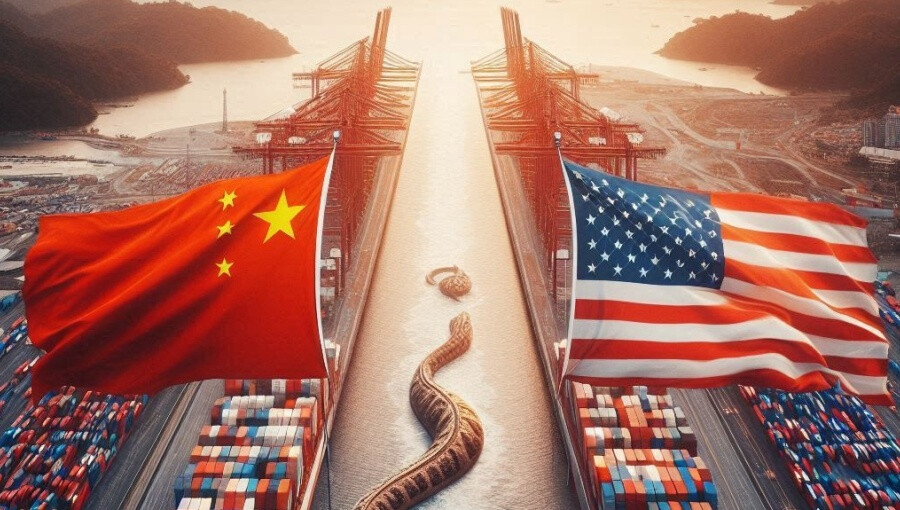
Washington D.C. - A recent report by the Center for Strategic and International Studies (CSIS) has unveiled the startling extent of China's presence in Latin American ports, revealing that Chinese companies now control or have a significant stake in 31 maritime facilities across the region. This figure is more than double what the U.S. government previously acknowledged, intensifying concerns in Washington about Beijing's growing influence in what was once considered America's backyard.
The CSIS report, as highlighted by the Financial Times, details Chinese involvement in ports stretching from Mexico to Chile. This includes seven ports operated by CK Hutchison Holdings, a conglomerate owned by Hong Kong billionaire Li Ka-shing's family. While past U.S. concerns have often centered on the Panama Canal, which President Donald Trump suggested should be reclaimed due to Chinese influence, the report identifies ports in Jamaica and Mexico as posing an even greater immediate threat to U.S. security.
These particular ports were flagged as high-risk based on several critical factors: their volume of U.S.-linked trade, the frequency of U.S. naval activities in their vicinity, their proximity to U.S. military installations, and their strategic importance.
Henry Ziemer, a research fellow at CSIS and co-author of the report, specifically pinpointed Kingston Port in Jamaica as "the most dangerous port in the Western Hemisphere." Despite being in a U.S. strategic ally nation, Kingston Port is operated by China Merchants Port, a Chinese state-owned enterprise. This direct control by a Chinese SOE raises significant red flags regarding potential dual-use capabilities and Beijing's strategic access.
The report further emphasized the economic vulnerabilities associated with Chinese-operated ports. Ziemer's analysis indicates that if the Mexican ports of Manzanillo and Veracruz, both operated by Hong Kong's CK Hutchison, were to be disrupted, the U.S. economy could face daily losses of $134 million and $63 million, respectively. These figures underscore the critical role these ports play in the regional and U.S. supply chains, making their control by a potentially adversarial power a significant concern.
Adding to the apprehension, CK Hutchison Holdings had previously attempted to sell its global port operating rights, including those in Panama, but these deals were reportedly stalled due to intervention from Chinese authorities. This intervention suggests a deliberate strategy by Beijing to maintain control over these crucial maritime assets, rather than simply allowing them to be divested as purely commercial ventures.
Beyond economic implications, a more ominous warning comes from military strategists who caution against viewing China's port expansion as merely an exercise in influence. There's a growing argument that these facilities could be converted for military use. Laura Richardson, former commander of the U.S. Southern Command, told the Financial Times that a $1.3 billion port under construction by China in Chancay, Peru, could potentially serve as a base for the Chinese Navy. She stressed that the concentration of Chinese port projects in strategically vital locations is "no coincidence" and urged a deeper examination into Beijing's motives for such massive investments.
Echoing this sentiment, Evan Ellis, a research professor of Latin American Studies at the U.S. Army War College, highlighted the dual-use nature of these commercial ventures. He stated that even if Chinese private companies enter for business reasons, the People's Liberation Army Navy (PLAN) stands to gain significant strategic advantages. Ellis suggested that China, in its pursuit of food and energy security, might seek access to these ports to prepare for a potential conflict with the United States. This perspective transforms the seemingly commercial investments into potential military footholds, giving Beijing crucial logistical and operational flexibility in a future crisis.
The expanding network of Chinese-controlled ports in Latin America presents a multifaceted challenge to U.S. national security, encompassing economic vulnerabilities, strategic positioning, and potential military applications. As China continues to deepen its engagement in the region, Washington faces the complex task of countering this growing influence while maintaining stability and cooperation with its Latin American partners.
[Copyright (c) Global Economic Times. All Rights Reserved.]





























